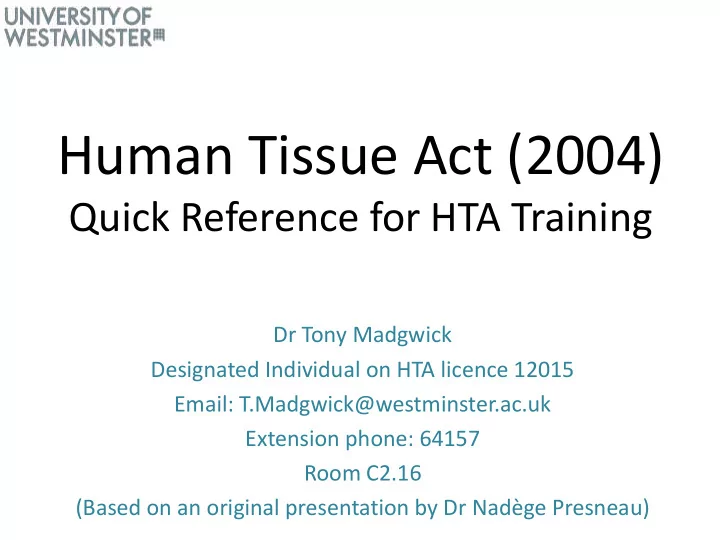

Human Tissue Act (2004) Quick Reference for HTA Training Dr Tony Madgwick Designated Individual on HTA licence 12015 Email: T.Madgwick@westminster.ac.uk Extension phone: 64157 Room C2.16 (Based on an original presentation by Dr Nadège Presneau)
Overview • Human Tissue Act was implemented on 1 st September 2006: • It provides the regulatory framework for: – the storage & use of human organs & tissue from the living – the removal, storage & use of tissue & organs from the deceased • Does not include removal, storage or use of tissue from the living for diagnosis or treatment • The Human Tissue Authority (HTA) regulates activities that fall under the Human Tissue Act (2004). • Information and Guidance documentation can be accessed from here: – https://www.hta.gov.uk/guidance-professionals
What does The Act do? • Makes consent the most important principle for the lawful retention and use of human tissue. • Under The Act, the following are illegal: – Removing, storing or using human tissue without consent – Taking and testing DNA without consent (DNA "theft “ ) – Storing tissue or organs for a purpose not designated as a Scheduled Purpose – Organ trafficking • Penalties range from a fine to three years imprisonment, or both.
What is relevant material under the Human Tissue Act? This is an important element of the Act, defining what human materials need to be recorded and tracked. See the website “ List of materials considered to be ‘relevant material’ under the Human Tissue Act 2004” for more details.
Download and Read the Code A here
Sector specific codes • In combination, Code A and the sector-specific Codes aim to provide anyone undertaking activities relevant to each sector with a reference source which gives practical advice on the minimum steps necessary to comply with the relevant legislation and HTA policy. • Code E is for Research and most relevant to activities within the University • Two documents to be downloaded and read: • E Research: Code of Practice and Standards • E Research: Standards and guidance
The Standards • The Licensing Standards reinforce the HT Act’s intention that: a) consent is paramount in relation to activities involving the removal, storage and use of human tissue; b) bodies of the deceased and organs and tissue removed from bodies are treated with respect; c) the dignity of the person, whether living or deceased, is maintained. • There are 18 standards under four Standard headings: 1. Consent (C) 2. Governance and Quality Systems (GQ) 3. Traceability (T) 4. Premises, facilities and equipment (PFE)
The Standards This is why you are looking at his document
The Standards
Storage, tracking and disposal of relevant material
Disposal of human tissue samples • Material removed from the living can be treated as clinical waste and should be disposed of by incineration • Acellular components (e.g. plasma or filtered urine) may be disposed of by autoclaving • If in doubt, consult the DI for disposal advice • The time, place and method of disposal should be recorded on the Tracking Form Yellow sharps bin or bags should be labelled ‘Waste Human Tissue for Incineration’.
HTA eLearning • You need to undertake training for a practical understanding of the Human Tissue Act if you – are intending to work with relevant material – need to recognise when human material might become “relevant” • If your research involves the storage and use of relevant material (as defined under the Human Tissue Act), you must complete the MRC HTA eLearning programme • This is required before applying to both College and University Research Ethics Committees for research ethics consideration if the project involves storage and use of relevant material.
eLearning and the HTA https://byglearning.co.uk/mrcrsc-lms/course/index.php?categoryid=1
What you need to know Test your knowledge and understanding and generate a certificate
You will be asked create a new account
Generate a certificate and submit a copy to the DI using the following filename format: surname_HTA_Cert_Year
Sample Tracking Database All relevant material will be tracked. BEFORE you begin collecting material, you must request a number series from the DI. You will then have access to the Sample Tracking Database where you will be responsible for recording the material’s journey. Look at all of the headings and ensure that the relevant information is correct and up to date.
Risk Assessment You are required to complete a risk assessment for the relevant material you are collecting and storing.
Recommend
More recommend